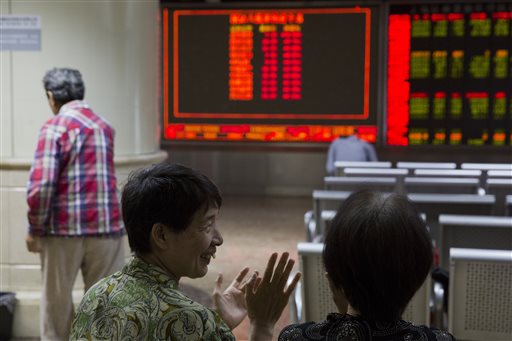Shanghai leads slump in Asia as world equity rout deepens

Investors monitor stock prices at a brokerage in Beijing on Aug. 21, 2015. Asian stocks sank deeper into crisis Monday, Aug. 24, and Shanghai fell the most in eight years as growing concerns that China’s slowing economy will drag on world growth rattled equity investors. AP PHOTO/NG HAN GUAN
HONG KONG–Asian stocks sank deeper into crisis Monday and Shanghai fell the most in eight years as growing concerns that China’s slowing economy will drag on world growth rattled equity investors.
Oil prices fell further after slipping below $40 a barrel for the first time since 2009, after weak Chinese manufacturing data deepened fears that the Asian giant is growing more slowly than thought.
China-linked shares led the falls, which spilled over into European and US equities, with Shanghai closing down 8.49 percent, or 297.83 points, to 3,209.91, the biggest daily loss since February 27, 2007.
Hong Kong’s benchmark fell 5.17 percent, or 1,158.05 points to finish the day at 21,251.57–its lowest point since May 2014.
Tokyo fell 4.61 percent, or 895.15 points, to a six-month low of 18,540.68. Seoul dropped 2.47 percent, or 46.26 points, to 1,829.81 and Sydney lost 4.09 percent, or 213.3 points, to finish at a two-year low of 5,001.3.
Article continues after this advertisement“Things are probably going to get worse before they get better,” Nader Naeimi, head of dynamic asset allocation at AMP Capital Investors Ltd. in Sydney, told Bloomberg News.
Article continues after this advertisement“You really need rate cuts and more policy easing in China. In the meantime, things can get worse.”
Global equities have lost more than $5 trillion in value since China’s shock currency devaluation on August 11 sparked fears its economy is slowing more than thought.
The surprise move sent commodities and Asia-Pacific currencies plunging, and pushed regional shares, as measured by the MSCI Asia Pacific Index, to a two-year low on Monday.
Data on Friday showing Chinese manufacturing activity slowed to a 77-month low added to the gloom, signaling that even a campaign by Beijing with its vast arsenal of reserves has not been able to stimulate growth.
Pension fund buying equities
More than 800 stocks listed in Shanghai fell by their maximum 10 percent daily limit, among them many of the brokerages that spurred a year-long rally that saw shares soar 150 percent before they collapsed in June.
Chinese authorities have since launched unprecedented measures to support shares. On Sunday state media said the huge national pension fund would now be allowed to buy equities, in a fresh bid to prop up the market.
The fund, which had some 3.5 trillion yuan ($550 billion) in net assets at the end of 2014, will be able to invest up to 30 percent of that in equities.
But local investors fear even Beijing’s huge firepower will not be enough to stop the rout in Chinese shares, particularly after the benchmark Shanghai index fell through the key 3,500 point mark.
“This is a real disaster and it seems nothing can stop it,” Chen Gang, Shanghai-based chief investment officer at Heqitongyi Asset Management Co., told Bloomberg News.
“If we don’t cut holdings ourselves, the fund (managed by his firm) faces risk of forced closure. Many newly started private funds suffered that recently. I hope we can survive.”
Oil prices also tumbled, accelerating losses after breaking below the $40 barrel for the first time in six years Friday on concerns about waning demand in China, the world’s top energy importer.
Data showing the number of US drilling rigs rose last week, despite the slump in prices, added to concerns a global supply glut will last for years.
The US crude futures benchmark, West Texas Intermediate (WTI) for October delivery, was down $1.29 to $39.16 while Brent fell $1.19 to $44.27.
Traders also dropped the dollar and move into the yen–a safe haven in times of turmoil and uncertainty–while the currencies of Malaysia, Thailand and South Korea all hit fresh multi-year lows.
The greenback fell to 120.66 yen in Asia Monday, down from 122.06 yen in New York Friday. The euro was at $1.1462 and 138.30 yen, from $1.1386 and 138.97 yen.
Gold traded at $1,154.00 compared to $1,156.45 late Friday.
In other markets:
— Taipei closed down 4.84 percent, or 376.58 points, at 7,410.34 after posting their biggest ever intraday decline of 7.49 percent.
Taiwan Semiconductor Manufacturing Co. lost 4.96 percent to Tw$115.0 while Hon Hai Precision closed 4.56 percent lower at Tw$81.6.
— Wellington dropped 2.50 percent, or 143.87 points, to an eight-month low of 5,607.32.
Heavyweight Fletcher Building was among the biggest losers, down 3.98 percent at NZ$7.23, while Air New Zealand slipped 0.93 percent to NZ$2.67.
— Manila fell 6.70 percent, or 487.97, points to 6,791.01, the largest one-day drop since June 2013.
Top-traded Ayala Land sank 9.03 percent to 33.75 pesos, while GT Capital Holdings plunged 10.13 percent to 1,136.00 pesos.
— Jakarta ended down 3.54 percent, or 153.58 points, at 4,182.38.
Home improvement retailer Ace Hardware Indonesia gained 10.53 percent to 630 rupiah, while palm oil company Eagle High Plantations fell 13.36 percent to 240 rupiah.
— Singapore closed down 4.30 percent, or 127.62 points, to 2,843.39.
Agribusiness company Wilmar International fell 6.02 percent to Sg$2.81 while palm oil giant Golden Agri-Resources slumped 6.45 percent to Sg$0.29.
— Kuala Lumpur ended Monday 2.70 percent lower, or 42.53 points, at 1,532.14.
Public Bank dipped 2.37 percent to 17.28 ringgit, Malayan Banking lost 3.14 percent to 8.32 ringgit while Top Glove added 1.31 percent to 8.50 ringgit.
— Bangkok plunged 4.73 percent, or 64.55 points, to 1,301.06
The privately owned Bumrungrad Hospital lost 7.39 percent to 213 baht while giant oil company PTT fell 9.43 percent to 240 baht.
— Mumbai slumped 5.94 percent, or 1624.51 points, to close at 25,741.56.
The biggest fallers were natural resources firm Vedanta, which slumped 15.30 percent to 80.25 rupees, and Tata Steel, which ended down 13.11 percent at 206.15 rupees.—With Bloomberg News